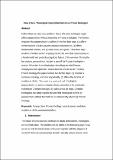Files in this item
How to be a be a theological panpsychist, but not a Process theologian
Item metadata
| dc.contributor.author | Leidenhag, Joanna | |
| dc.date.accessioned | 2021-07-13T23:36:57Z | |
| dc.date.available | 2021-07-13T23:36:57Z | |
| dc.date.issued | 2020-07-14 | |
| dc.identifier | 266223070 | |
| dc.identifier | cc4a7998-eec1-4a14-b1ec-c44cb79f0f47 | |
| dc.identifier.citation | Leidenhag , J 2020 , ' How to be a be a theological panpsychist, but not a Process theologian ' , Philosophy, Theology and the Sciences , vol. 7 , no. 1 , pp. 10-29 . https://doi.org/10.1628/ptsc-2020-0003 | en |
| dc.identifier.issn | 2197-2834 | |
| dc.identifier.other | ORCID: /0000-0002-1164-7032/work/83086254 | |
| dc.identifier.uri | https://hdl.handle.net/10023/23541 | |
| dc.description.abstract | Follow these six easy steps and learn how a Christian theologian might affirm panpsychism, without becoming a Process theologian. The Genetic Argument for panpsychism is outlined in the first four steps: (1) affirm mental realism, (2) deny psycho-physical reductionism, (3) affirm fundamental monism, and (4) deny brute emergence. These four steps result in a flexible version of panpsychism; the view that consciousness is a fundamental and probably ubiquitous feature of the universe. During the last century, panpsychism has been a part of the Process theologian’s arsenal. What then is the theologian, who disagrees with Process metaphysics and rejects the Process doctrine of God, to do? To deny Process theology this paper outlines two further steps: (5) maintain a substance ontology, and most importantly, (6) affirm the doctrine of creation ex nihilo. The result is a position I call ‘theological panpsychism’; a version of panpsychism compatible with traditional, mainstream Christian theology. By taking these six steps, Christian theologians can safely explore the potential theological benefits of panpsychism, without fear that one is inadvertently advancing Process theology. | |
| dc.format.extent | 20 | |
| dc.format.extent | 246114 | |
| dc.language.iso | eng | |
| dc.relation.ispartof | Philosophy, Theology and the Sciences | en |
| dc.subject | Panpsychism | en |
| dc.subject | Process theology | en |
| dc.subject | Consciousness | en |
| dc.subject | Evolution | en |
| dc.subject | Creation ex nihilo | en |
| dc.subject | Panexperientialism | en |
| dc.subject | BV Practical Theology | en |
| dc.subject | T-NDAS | en |
| dc.subject.lcc | BV | en |
| dc.title | How to be a be a theological panpsychist, but not a Process theologian | en |
| dc.type | Journal article | en |
| dc.contributor.institution | University of St Andrews. School of Divinity | en |
| dc.identifier.doi | https://doi.org/10.1628/ptsc-2020-0003 | |
| dc.description.status | Peer reviewed | en |
| dc.date.embargoedUntil | 2021-07-14 |
This item appears in the following Collection(s)
Items in the St Andrews Research Repository are protected by copyright, with all rights reserved, unless otherwise indicated.

